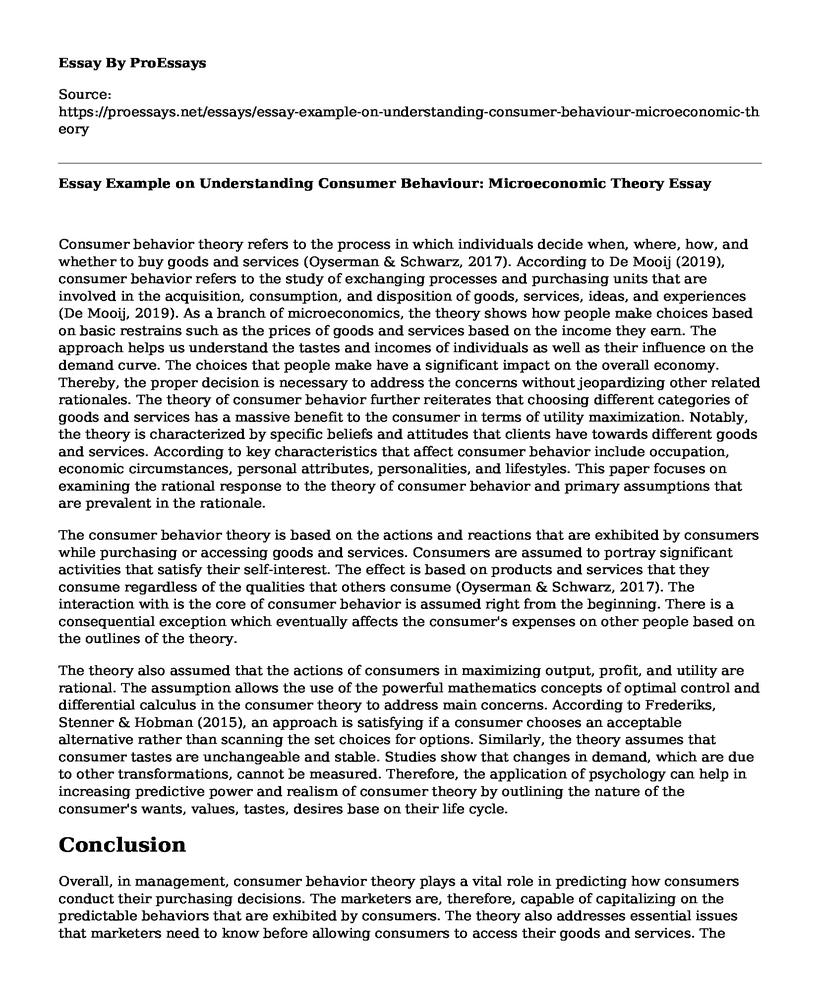Consumer behavior theory refers to the process in which individuals decide when, where, how, and whether to buy goods and services (Oyserman & Schwarz, 2017). According to De Mooij (2019), consumer behavior refers to the study of exchanging processes and purchasing units that are involved in the acquisition, consumption, and disposition of goods, services, ideas, and experiences (De Mooij, 2019). As a branch of microeconomics, the theory shows how people make choices based on basic restrains such as the prices of goods and services based on the income they earn. The approach helps us understand the tastes and incomes of individuals as well as their influence on the demand curve. The choices that people make have a significant impact on the overall economy. Thereby, the proper decision is necessary to address the concerns without jeopardizing other related rationales. The theory of consumer behavior further reiterates that choosing different categories of goods and services has a massive benefit to the consumer in terms of utility maximization. Notably, the theory is characterized by specific beliefs and attitudes that clients have towards different goods and services. According to key characteristics that affect consumer behavior include occupation, economic circumstances, personal attributes, personalities, and lifestyles. This paper focuses on examining the rational response to the theory of consumer behavior and primary assumptions that are prevalent in the rationale.
The consumer behavior theory is based on the actions and reactions that are exhibited by consumers while purchasing or accessing goods and services. Consumers are assumed to portray significant activities that satisfy their self-interest. The effect is based on products and services that they consume regardless of the qualities that others consume (Oyserman & Schwarz, 2017). The interaction with is the core of consumer behavior is assumed right from the beginning. There is a consequential exception which eventually affects the consumer's expenses on other people based on the outlines of the theory.
The theory also assumed that the actions of consumers in maximizing output, profit, and utility are rational. The assumption allows the use of the powerful mathematics concepts of optimal control and differential calculus in the consumer theory to address main concerns. According to Frederiks, Stenner & Hobman (2015), an approach is satisfying if a consumer chooses an acceptable alternative rather than scanning the set choices for options. Similarly, the theory assumes that consumer tastes are unchangeable and stable. Studies show that changes in demand, which are due to other transformations, cannot be measured. Therefore, the application of psychology can help in increasing predictive power and realism of consumer theory by outlining the nature of the consumer's wants, values, tastes, desires base on their life cycle.
Conclusion
Overall, in management, consumer behavior theory plays a vital role in predicting how consumers conduct their purchasing decisions. The marketers are, therefore, capable of capitalizing on the predictable behaviors that are exhibited by consumers. The theory also addresses essential issues that marketers need to know before allowing consumers to access their goods and services. The study of the theory of consumer behavior helps salespersons, business managers, and marketers to decide the location of their products and services for easy access by the consumer. According to Nguyen, de Leeuw, S., & Dullaert (2018), the management also uses the theory to understand all factors that influence consumers' buying decision as well as try to find out best promotion methods that can be of great significance in attracting consumers to purchase the product. Overall, the theory of consumer behavior design best products and services that is capable of satisfying the need and demands of the consumers.
References
De Mooij, M. (2019). Consumer behavior and culture: Consequences for global marketing and advertising. SAGE Publications Limited.
Frederiks, E. R., Stenner, K., & Hobman, E. V. (2015). Household energy use: Applying behavioral economics to understand consumer decision-making and behavior. Renewable and Sustainable Energy Reviews, 41, 1385-1394. https://doi.org/10.1016/j.rser.2014.09.026
Nguyen, D. H., de Leeuw, S., & Dullaert, W. E. (2018). Consumer behavior and order fulfillment in online retailing: a systematic review. International Journal of Management Reviews, 20(2), 255-276. https://doi.org/10.1111/ijmr.12129
Oyserman, D., & Schwarz, N. (2017). Conservatism as a situated identity: Implications for consumer behavior. Journal of Consumer Psychology, 27(4), 532-536. https://doi.org/10.1016/j.jcps.2017.08.003
Cite this page
Essay Example on Understanding Consumer Behaviour: Microeconomic Theory. (2023, Feb 21). Retrieved from https://proessays.net/essays/essay-example-on-understanding-consumer-behaviour-microeconomic-theory
If you are the original author of this essay and no longer wish to have it published on the ProEssays website, please click below to request its removal:
- Persuasive Advertising
- Go Green Drains Launch Report
- The Relevance of Soft Skills to Employability Skills Paper Example
- Essay Example on Stop Smoking: Poster Encourages Ethical Behavior and Prevention
- Essay Example on Evolution of Trade, Tourism, Migration, and Remittances in the Region
- Essay Example on Leaders: Values for Successful Organizations
- Paper Example: Are Business Monopolies Essential for Economic Growth?







